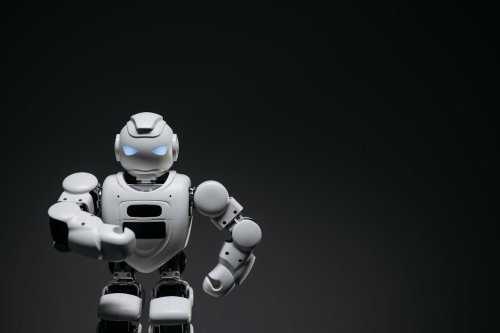AI Won’t Steal Every Job—But It’s Coming for These (And Nobody’s Ready)
Forget the tired debates about AI "taking over." That ship sailed when ChatGPT started writing poetry better than half the internet. The real question now? Which human jobs are actually on the chopping block—and which ones might survive the algorithm apocalypse?

They told us robots would just do the boring stuff. Turns out, they’re coming for the smart jobs too.
Forget the tired debates about AI "taking over." That ship sailed when ChatGPT started writing poetry better than half the internet. The real question now? Which human jobs are actually on the chopping block—and which ones might survive the algorithm apocalypse?
This isn’t another doomscroll-worthy piece saying "robots will take all our jobs." Nope. We’re diving into the uncomfortable truth about AI and employment in 2025—what professions are already cracking, which ones are next, and the wild ways people are fighting back (or giving in).
The Lie We Loved: “Only Repetitive Jobs Are at Risk”
Let’s kill this myth upfront. For years, we were comforted with this idea:
"Don’t worry—AI will only replace boring, repetitive work like data entry or factory lines."
Yeah… about that.
In 2025, the AI tools reshaping industries aren’t clunky robot arms—they’re smart, sleek, and disturbingly creative. Copywriters. Legal researchers. Customer service reps. Even some coders. All seeing their job security melt faster than an ice cream cone in Karachi heat.
Let’s break it down by profession.
Professions Already on Life Support
1. Customer Support (Especially Chat-Based)
AI doesn’t sleep. It doesn’t ask for bathroom breaks. And it’s gotten really good at mimicking human chat.
Call centers in the Philippines? Slashing jobs.
E-commerce stores? Replacing agents with 24/7 AI chatbots.
Real Talk: The scary part isn’t just that AI can answer FAQs. It’s that it’s learning to calm angry customers, upsell products, and even do basic troubleshooting. Ouch.
2. Content Writers & Copywriters
Irony alert: I’m a human writing this. But I’ve seen the battlefield. And it’s brutal.
Low-tier content farms? Obliterated.
SEO article writers? Replaced in bulk by AI tools that churn out 100 blog posts an hour.
Here’s the twist.
Good writing still matters—but only when it’s deeply original, opinionated, or… well, human as hell.
If your writing sounds like Wikipedia with a pulse? Sorry. AI’s already better at that.
3. Data Analysts (Entry-Level)
Used to be, companies hired teams to pull reports and interpret basic trends. Now? AI dashboards like Power BI + GPT integrations can do that in a few clicks.
Even predictive modeling—once a data science flex—is being auto-generated by AI in finance, marketing, and logistics.
So what’s left? Strategy. Context. Asking the right questions.
But here’s the kicker… most junior analysts aren’t trained for that.
4. Paralegals & Legal Researchers
Law used to be safe. Complicated, right?
Turns out, 80% of a junior paralegal’s job is research, doc review, and organizing arguments.
Now there’s AI that can scan legal databases, summarize precedents, and even suggest contract edits faster than a fresh law grad.
Big law firms are noticing. And hiring fewer humans.
5. Graphic Designers (Low & Mid-Tier)
Let’s be real—if you’re still using Canva templates, you’ve already lost.
AI tools like Midjourney, DALL·E, and Adobe Firefly are giving brands customized visuals in seconds. You ask for “vintage-style label for organic shampoo with gold leaves”? Done. No mood boards required.
Design isn’t dead, but low-effort, cookie-cutter stuff? It’s already buried.
Jobs AI Can’t Kill (Yet)
Some professions are proving harder to crack—not because they’re "too advanced," but because they involve nuance, emotion, or messy human unpredictability.
1. Mental Health Professionals
Try replacing a therapist with a chatbot. Actually—people tried. And it went... bad.
Sure, AI can guide breathing exercises or suggest CBT techniques. But when someone’s in crisis? A real human voice matters. Empathy is hard to fake.
2. Skilled Trades (Electricians, Plumbers, Mechanics)
You can’t ask ChatGPT to fix your AC or climb a pole during a thunderstorm.
Bonus: These jobs often require creative problem-solving in physical spaces—something current AI and robotics just can’t do at scale.
Let’s call it the “sweaty hands” advantage. Still safe. For now.
3. High-Level Strategists & Consultants
Even if AI can generate options, choosing the right move for a unique business? That’s still a very human skill.
Think of AI like a sous chef—it preps your ingredients. But who decides the recipe? The head chef. That’s you. (Unless you get replaced too, lol.)
4. Teachers (Real Ones, Not Zoom Avatars)
AI tutors exist. But great teaching? It’s not just facts. It’s knowing which student is zoning out. It’s cracking jokes mid-lecture. It’s spotting a spark in a kid who’s almost given up.
Real teachers are irreplaceable. As long as schools value humans over screens.
5. Performers, Artists, Storytellers
AI can write scripts, paint portraits, even make music. But there’s a soul-missing piece.
When Kendrick Lamar drops a verse, or a street poet bares their truth—it’s not just content. It’s a lived experience. AI can mimic style. But it can’t feel.
And deep down, audiences can tell.
So… Where Do We Go From Here?
Adaptation Is the New Job Security
You’ve got two choices. Ignore the shift—and risk becoming obsolete.
Or lean in. Learn to use AI like a power tool, not fear it like a monster.
Writers can become content strategists.
Designers can pivot to brand consultants.
Analysts can evolve into insight storytellers.
Even truck drivers might learn to supervise autonomous fleets instead of resisting them altogether.
How to Future-Proof Your Career (Without Losing Your Mind)
- Get AI-fluent. No, not coding—just understanding how tools like ChatGPT, Notion AI, or Midjourney can boost your work.
- Build your soft skills. Empathy, persuasion, storytelling, intuition. AI can’t touch these (yet).
- Think like a human. Originality > repetition. Perspective > data. Humans beat AI when we stop trying to sound like robots.
Final Thought: Will You Adapt—Or End Up Obsolete?
Here’s the blunt truth: AI isn’t coming. It’s here. It’s fast. And it’s learning faster.
But that doesn’t mean you’re doomed. It means the rules have changed.
The real winners in this AI-fueled future won’t be the smartest or even the most technical—they’ll be the ones who evolve.
So, what’s it gonna be?
Will you play it safe and hope your job survives?
Or roll up your sleeves and out-human the machines?
The clock’s ticking.
Share
What's Your Reaction?
 Like
0
Like
0
 Dislike
0
Dislike
0
 Love
0
Love
0
 Funny
0
Funny
0
 Angry
0
Angry
0
 Sad
0
Sad
0
 Wow
0
Wow
0













